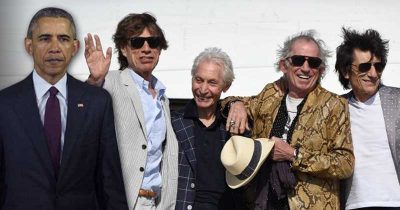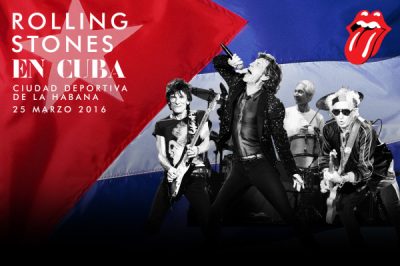By
Tom Arms
The President of the United States is not used to being a warm-up act. I mean his finger is the one that hovers over the button that can dispatch 7,200 nuclear warheads. His country’s economy is the largest in the world and he controls a federal budget of $3.8 trillion. He is—as we are often told—the most powerful man in the world.
But when Barack Obama steps off Air Force One at Havana Airport on the 20th of March, a warm-up act is exactly what he will be.
For on the 25th of March—only three days after the president leaves for the rest of his Latin American tour—The Rolling Stones arrive for a free open air concert and the communist bastion is preparing to PAR-TEEE.
Obama’s visit is indeed historic. If it is not the actual end of at-each-other’s-throats Cuban-American relations, then it is—to coin a phrase—the beginning of the end. Only good can come from anything that eases the deep-seated mutual antipathy and fear which dragged the world to the nuclear brink in October 1962.
The President started down the normalisation road 15 months ago. Since then he has symbolically shaken the hand of President Raul Castro; linked Cuba to American airports; allowed American citizens to visit the island, reopened the US Embassy, and started the beginnings of trade.
However, a complete lifting of the economic blockade needs the approval of Congress. And their hands are tied by a complex web of legislation with the the 1992 Cuban Democracy Act at the centre. This legacy of the elder Bush Administration dictates that the sanctions stay in place “as long as the (Cuban) government refuses to move towards democratisation and greater respect for human rights.” This, of course, involves a judgement call and at the moment the judgement of the Republican-controlled Congress is that there has been little or no movement in the democratic direction.
This leaves Cuban-American relations in a Catch-22 situation. The Cubans equate socialism with independence from a giant neighbour who has been interfering in their affairs since the first half of the nineteenth century. Americans—especially Republicans—equate socialism with unacceptable anti-Democratic and anti-American values.
That is not to say that there has been no change on the island. Even before Raul replaced his brother in July 2006 the Cubans had been undergoing their own Glasnost. They had to. The 1991 collapse of their Soviet mentors cut the Cuban GDP in half overnight. Unemployment soared and food was rationed. Over the past ten years the Cubans have clawed their way back towards economic normality by privatising a quarter of the economy and allowing the sale of property. But there are no more protective big brothers on the horizon, the lifting of sanctions appears to be the only available route to prosperity.
Enter the Stones.
Rubber-lipped Sir Mick Jagger and his high-decibel band of four started their musical career at almost the same time as the Castro brothers were tweaking the American nose. Very quickly they became the standard bearers of the 1960s youth-oriented counter culture. Everything about them shouted: Look at me, me, me. I am a new age individual not bound by the restrictions of class, clothes, society and hair length. I am determined to plough my own furrow in life.
The Western establishment figures on both sides of the Atlantic hated them and many viewed them as an even greater threat than the Kremlin plotters.
But no one hated them as much as the communists. And in Cuba they were—along with the Beatles and every other rock group– BANNED.
Rock’s message about the power of the individual struck at the heart and soul of communism. It was a system which demanded that every member of society subjugate their individual needs to the greater good of the whole. Even today Cuba’s visitors are subjected to a constant stream of blast from the past Cold War anti-American propaganda and brightly coloured billboards either implicitly or explicitly shouting; “Los trabajadores se unen” – Workers Unite.
Obama’s visit will grease the wheels of commerce. And that is a good thing. But if there is to be a lasting change in Cuban society then it will come from the Stones defeating the communist soul.
Tom Arms broadcasts on world affairs for a number of US radio stations including WTKF at http://www.wtkf107.com/. His Weekly Viewpoints discussion programme can be heard at 1830 EST on Wednesdays and his LookAhead at the next week’s main events on Fridays at 1800.
LookAhead Radio World Report for week commencing 14th March:




No Comments Yet!
You can be first to comment this post!